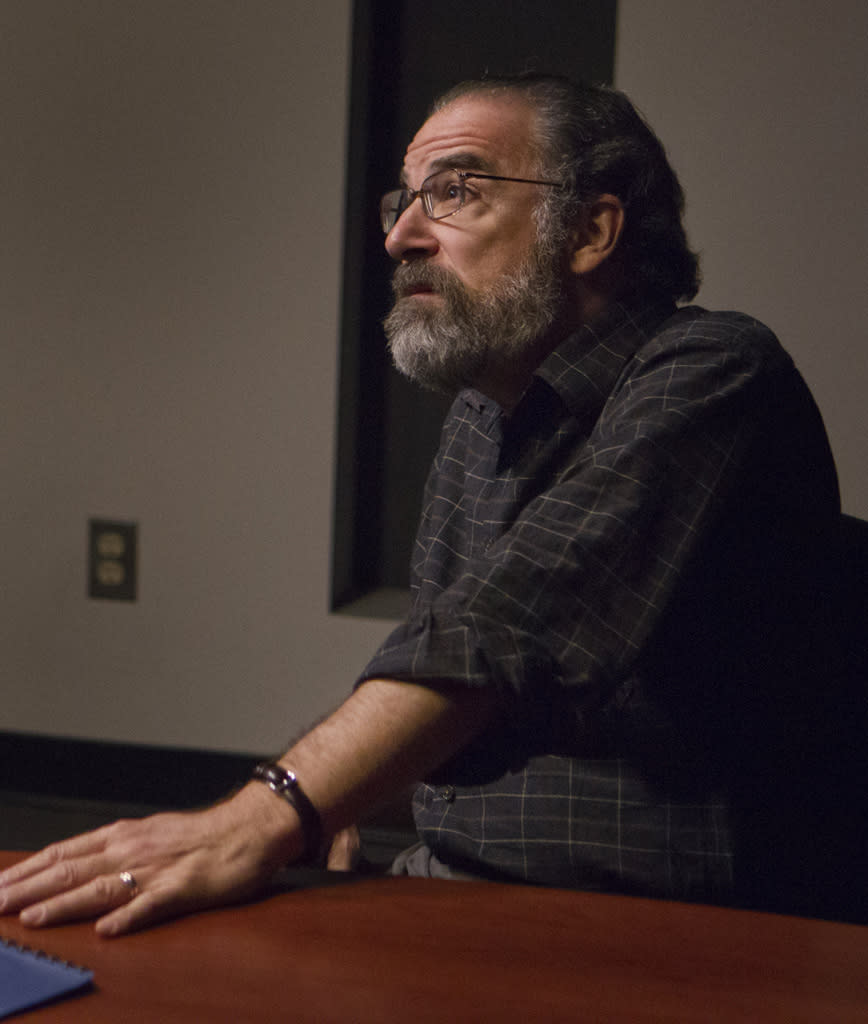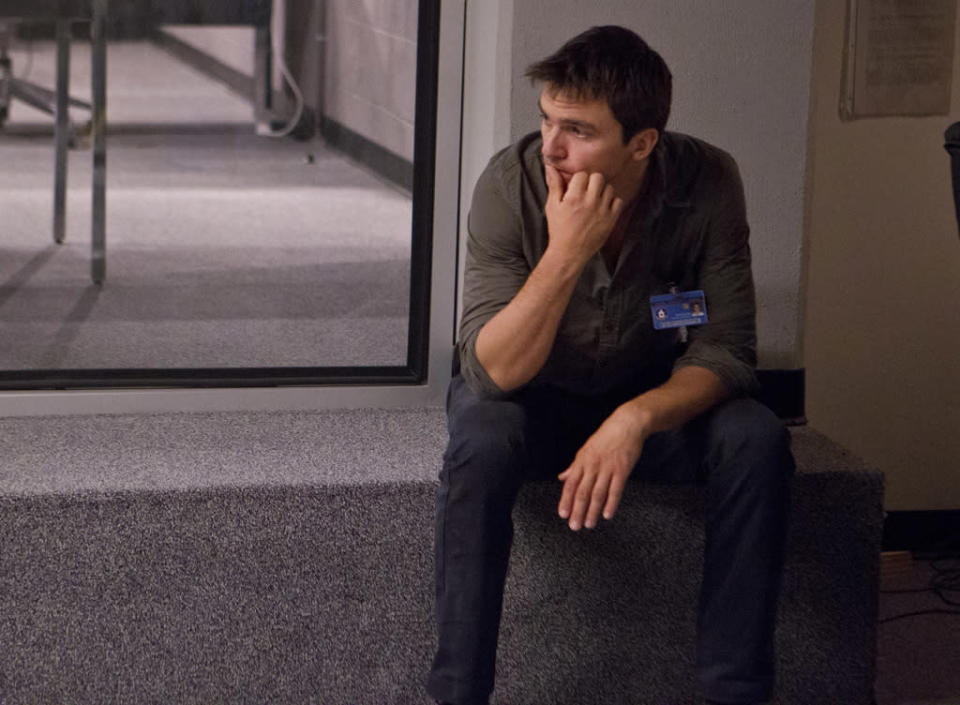'Homeland' recap: Death before, during, and after dishonor
Carrie is alive, and Carrie is correct… again. She emerges unscathed from the pitch-dark room we saw her walk into; wanders around a bit before emerging like a deer into the literal headlights of the CIA tac team sent to the mill to find Nazir; lies to Quinn that she escaped because she "was lucky," and pretends she doesn't know Vice President Walden had to die to spare her; and even though she's all banged up, hasn't slept in about a week, and wrongly accuses Galvez of trying to escape the mill perimeter with Nazir in his car, Carrie slips into an interrogation room with Roya, gets cursed out, picks up on a minor point of Arabic usage to figure out that Nazir is still in the mill's tunnels somewhere, goes back to the mill to hunt him down, and lures him into the circle of tac-team gunfire that kills him just as he's reaching into his breast pocket to detonate something.
Did you get all that? Here's the short version: season-long critical comparisons aside, Carrie Mathison isn't actually Jack Bauer of "24." Rather, she's a higher-strung version of Detective Robert Goren of "Law & Order: Criminal Intent," the intuitive polymath played by Vincent D'Onofrio who managed to be right even when he was wrong. (And whose mother suffered from bipolar disorder, if we recall correctly.)
Nazir is dead; long live Nazir
It's great that "Homeland" resolved so many plot points in "The [Motherscratcher] in a Turban" (called "In Memoriam" on the Showtime website). Nazir's death in particular needed to happen. The writers have never explained how Nazir got into the country in the first place (various characters incredulously exclaiming variations on "but that's impossible!" notwithstanding), and while we respected that choice -- few clarifications would have felt satisfying, much less realistic -- they couldn't press their luck by continuing to allow Nazir to elude capture while still lurking foolishly in the DC metro area. And now that we know Quinn's primary purpose is to "dispose of" Brody once he's no longer of use, it's time to move that along, or try to.
The Brody marriage comes to a merciful end, and we appreciate that too. It's conducted largely in resentful (Jessica) and helpless (Brody) silences at this point -- their "conversation" about Walden's death leads to an attempt by Jess to point out that everything has changed, then typically gets interrupted by a phone call from Carrie that Brody both has to and should not take -- and when Dana's brattiness finally pays off with a stir-crazy meltdown over a carton of milk and she yells in so many words that the family is better off with Mike, it's a relief, for everyone. Later, released to their actual home by Nazir's demise, the kids go inside and Jess and Brody get real.
[Related: Check out the other troubled VP on TV in our "Scandal" recap]
Not before Chris gets dumb again, though: "I'll miss that place, they made the bed for you." Dana: "That was Mom, you moron." "Mom" also was mopping up the -- literal -- spilled milk during Dana's truth-to-power moment, and these two seeming throwaways are a nice figuration of Jess trying to clean up a situation that can't be cleaned up. She gets that at last, telling Brody, "I don't want to fight anymore, even for something. I'm tired of fighting." So is Brody. Among other things, he's tired of fighting to keep the truth in, and starts to tell Jess what was really going on the day Carrie came to the house and said "crazy things." Jess doesn't want to know the truth anymore, she says -- but that's not quite it. She does know the truth, that Carrie "knows everything about" him, that he "must love her a lot"… that, as he says, they were done for as a couple as soon as he went to Iraq. She just doesn't want to know it and pretend she doesn't anymore. After a pointed shot of Jess's wedding band as her hand rests on his arm, Brody asks what they'll tell the kids. Nothing they don't already know, she says.
It's good that that's done with, and it's good that Saul's interrogation gets straight to the point. (We loved the casting of that; James Urbaniak, who plays threatening iterations of Dwight on "The Office" -- you may remember him as The Accountant on "Kidnapped" -- sets up the polygraph machine. The Ivan-Drago-jawed Chance Kelly, usually cast as an adversarial military guy of some sort, is the questioner.) Saul knows what's up; told to calm down or he'll fail the test, he snorts that of course he will, that's the point. He's asked about his role in Eileen's suicide and whether he supplied the weapon, and about the illegal surveillance of Brody, and he knows Estes is gathering enough blackmail material to warn him off -- either of reporting Quinn's real mission to superiors, or of interfering with said mission. Estes doesn't argue with that contention, saying he's tired of Saul undermining him: "I want you gone." Saul can put whatever spin he'd like on his departure, but if Saul tries to cross him, he'll tie Saul up in hearings 'til kingdom come.
What lies ahead
So, like we said, the show's momentum is good heading into the season finale, and if things go the way we hope they will -- note: we have no information about the last ep; this is speculation, not spoilers -- Quinn will assassinate Brody and set up a "Saul and Carrie try to expose the government" story for the third season. It's the only believable direction the story can go, really. Yes, it's sweet that Brody shows up at Carrie's apartment at the end of the episode and tells her that between her and Walden, there was no choice. But part of the chemistry between them is the forbidden, and even if Carrie and Brody can make it work on the quotidian domestic level, pay cable ain't about watching happy couples read items out to each other from the Washington "Post" over coffee. And, you know, they both know he facilitated Walden's death. If Brody dies, that loose end gets tied up. The only other option is to send them on the lam, and as much as we liked "The A-Team" as kids, it isn't what the show does well.
But one of the things the show does do well, it's in danger of overusing: Carrie getting it wrong, then getting it right; making a smaller mistake, but nailing the big stuff. Her interrogation of Roya is a perfect example. Roya sucks her in by "tearfully" asking if Carrie's ever known "someone who takes over your life, pulls you in, gets you to do things that aren't really you, that you know are wrong -- but you can't help yourself?" A tear trickles down Carrie's cheek as she says she has. Roya: "Well, I've… never been that stupid, you idiot whore!" And yet, from the rant in Arabic that follows, Carrie gleans a key bit of grammar -- Roya used a word that indicates Nazir would not physically run, versus figuratively backing down -- to figure out that Nazir is still in the tunnels. We half expected her to bend in half at the waist and stare at Roya a la D'Onofrio's Goren. (And is there some reason nobody thought to put dogs on Nazir's scent?)
We liked "In Memoriam" -- Carrie's moment with Nazir's body, trying to process the death of a man she's hunted for years, at tremendous cost; Saul's snarky aside during the polygraph that he's getting clocked for "excessive use of office supplies" -- but we won't know how much we liked it until we see where it leads. The examiner tells Estes, with many significant pauses, that Saul went on a "crazy rant" about an attempt to assassinate a U.S. Congressman; the machine indicated this is true, but the examiner omitted it from his report as "an anomaly." Again, it's the only direction we can logically see the show going -- Brody is assassinated, Saul and Carrie team up to avenge him and themselves, and next season's Big Bad is the CIA itself -- and the writers have shown they've got the cojones to plot themselves into dangerous corners.
Enter the one-armed man?
But as a friend pointed out to us, if they don't go that way, "Homeland" turns into "The Fugitive," defanged, stakes-free. When the Brodys' safe-house liaison announces, "You're all safe now, Congressman. You can all go home," we know that Brody is the least safe of them all -- and that in every important way, he can't go home. This is, in its way, the overarching principle of the show, its main motif. And if the show, like Jess, knows that, but pretends it doesn't… we can watch Claire Danes crying on our MSCL DVDs instead.
Watch Damian Lewis talk to Jimmy Kimmel last month:
"Homeland" airs Sundays at 10 PM on Showtime.





